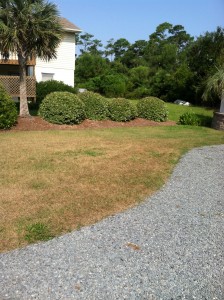Summer is in full swing along the coast and along with the fun and festivities there is a new visitor that has shown up on local lawns – the army worm. Army worms can invade your lawn and destroy it overnight. They are very aggressive pests.If you observe brown patches of bermudagrass which rapidly spreads and enlarges, start inspecting for armyworms. The caterpillars feed at night, so the culprit of the damage is not noticeable at first. One of the first signs of a fall armyworm infestation in your lawn will be several birds clustered on the turf. Fall armyworms will eat many kinds of grass, but their favorite is bermudagrass that is well fertilized and watered. Homeowners frequently notice them after their grass starts to thin. Fall armyworm damage often seems to appear suddenly overnight. The young armyworms do not eat very much. Almost all the damage is caused by the older caterpillars which eat more than all the other ages put together. Large fall armyworms will often “march” into an uninfested area in search of food once an adjacent lawn has been defoliated. To inspect your lawn for armyworms, simply mix about two tablespoons of a lemon-scented dishwashing detergent in one gallon of water and pour it over a one square foot area of the lawn. If armyworms are present, they will quickly come to the top of the sod. Several insecticides are available to homeowners that will provide effective control of fall armyworms; trichlorfon (Bayer Advanced), carbaryl (Sevin) 50WP, Bacillus thuringiensis (Dipel WP) and various pyrethroids. Always be sure to read and follow label directions.
Bill Tyson is the coordinator for Effingham County Cooperative Extension of the University of Georgia. Email


